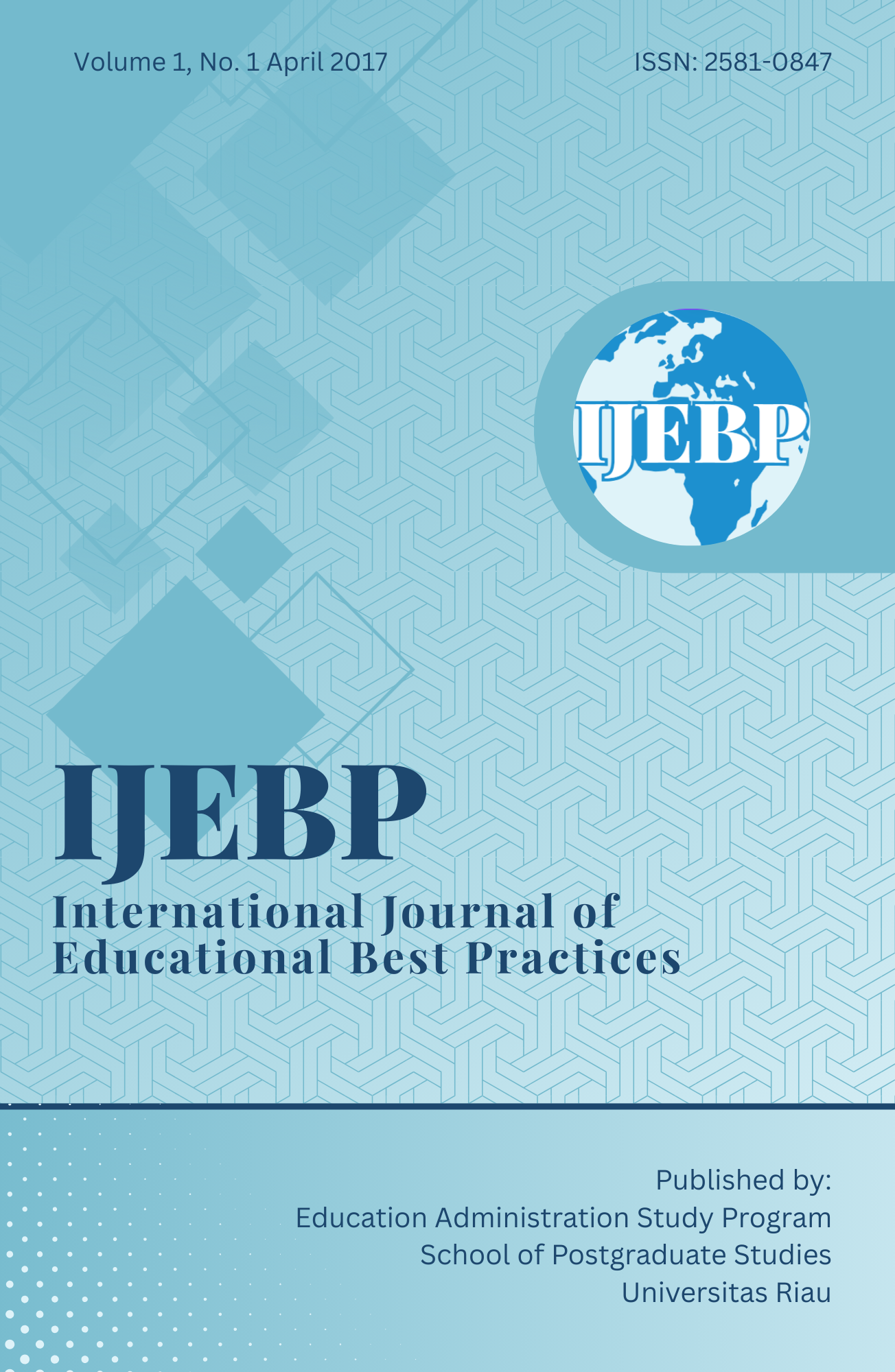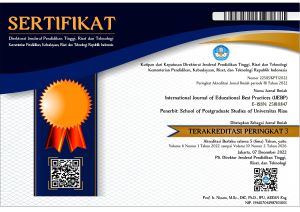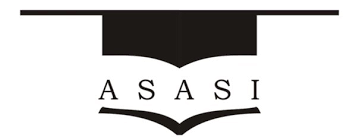The Students’ Perceptions of the Strategies in the Process Approach
DOI:
https://doi.org/10.31258/ijebp.1.1.73-91Keywords:
perceptions, strategies, process approachAbstract
The main objective of this study was to examine the students’ perceptions of the strategies in the Process Approach. The subjects were 30 English Department students of Riau University taught using Process Approach. A set of questionnaire and semi-structured interview were used to collect the data. The level of perceptions was differentiated into three: Highly Positive, Positive and Negative. The results showed that all students had Positive and Highly Positive level of perception and no students had Negative perception of the strategies in the Process Approach. From the results of the interview, five categories were found. All of them reported positive opinions on the Process Approach and considered the editing and revising strategies as most useful. Besides, they stated that the steps in Process Approach were more systematic, specific, comfortable, more meaningful and livelier than other approaches. They all perceived that their writing performance had improved after the Process Approach intervention. The area of improvements were in collecting ideas, editing strategy, choice of words and the way how to write an essay. They also suggested on the application of the Process Approach for other writing classes. The findings from the interviews were in line with the findings from the questionnaire which revealed that students had favorable perceptions of the Process Approach. In light of these findings, it can be suggested that the Process Approach has the potential to be used as alternative instructional tools to improve students’ writing performance.
References
Al-Khasawneh, Fadi Maher Saleh . (2009). Writing for Academic Purposes: Problems Faced by Arab Postgraduate Students of the College of Business. UUM.www.espworld.info/articles_28/writing.pdf. Retrieved on Mei 5, 2011.
Atkinson. D. (2003). L2 writing in the post-process era: Introduction. Journal of Second Language Writing, 12 (1), 3-15. http://dx doi.org/10.1016/S1060-3743 (2) 00123-6.
Babalola, Halira Abeni Litinin. (2012). Effects of Process-Genre Based Approach on the Written English Performance of Computer Science Students in a Nigerian Polytechnic. Journal of Education and Practice. Vol 3, No 6, 2012.
Badger, R and White, G. (2000). A Process Genre Approach to Teaching Writing. ELT Journal, 54/2: 153-160. Oxford University Press, Academic Division: Oxford.
Cohen, L., Manion, L., & Morrison, K. (2007). Research methods in education (Sixth ed.). US: New York: Routledge.
Ezzy, D. (2002). Qualitative Analysis: Practice and Innovation. London: Routledge.
Crème, Phyllis and Mary R. Lea. (2008). Writing at University. A Guide for Teachers. Third edition. New York: McGrawhill Open University Press.
Gay, LO. R. & Airasian, P. (2000). Educational research. Competencies for analysis and application. 6th edition. New Jersey: Prentice Hall.
Gee, James Paul. (2005). An Introduction to Discourse Analysis. Theory and Method. Second edition. London and New York: IJ Routledge
Harmer, Jeremy. (2007). The Practice of English Language Teaching. Fourth Edition. China: Pearson, Longman.
Hyland, K. (2008). “Writing Theories and Writing Pedagogies”. Indonesian Journal of English Language Teaching. Volume 4/Number 2. October 2008.
Hyland, K. (2003). Second Language Writing. USA: Cambridge University Press. Kroll, B. (1990). Second language writing: research insights for the classroom. Cambridge: Cambridge University Press.
Leki, Ilona. (1995). Academic Writing. Exploring Processes and Strategies. Second Edition. New York: St. Martin’s Press.
Lindsay, P. & Norman, D.A. (1977). Human Information Processing: An Introduction to Psychology, University of Michigan, Academic Press.
Mackey, A & Gass, S. 2005. Second Language Research: Methodology and design. Mahwah, NJ: LEA, Publishers.
Matsuda, Paul Kei. (2003). Process and post-process: A discursive history. Journal of Second Language Writing, 12: 65-83.
Morgan, Alber, et.al. (2007). Teaching Writing for Keeps. Education and Treatment of Children. Volume 30, Number 3, pp.107-128.
Myles, J. (2002). Second language writing and research: The writing process and error analysis in student texts. TESL-EJ, 6 (2), 1-20.
Nunan, D. (1991). Language Teaching Methodology. Hemel Hempstead: Prentice Hall International.
Oshima, A., & Hogue, A. (2006). Writing academic English (4th ed.). London, England: Addison Wesley.
Paltridge, B. (2007). Approaches to Genre in ELT. In J. Cummin and C. Davison (Eds). International Handbook English Languge Teaching, Vol. 15, 931-943. Springer US.
Paltridge, Brian. (2004). Academic writing. Review Article Lang. Teach. 37, 87–105. DOI:10.1017/S0261444804002216 Printed in the United Kingdom c_2004 Cambridge University Press.
Paltridge, B. (2001). Genre and the language learning classroom. Ann Arbor: University of Michigan Press.
Paltridge, B. (1996). Genre, text type, and the language learning classroom. ELT Journal, 50(3), 237-243.
Peha, Steve. (1995-2002). The Writing Process Notebook. www.ttms.org.
Pullman, G. (1999). Stepping yet again into the same current. In T. Kent (Ed.) Post-Process Theory: Beyond the Writing Process Paradigm, pp. 16-29. Carbondale, IL: Southern Illinois University Press.
Setiyadi, Ag. Bambang. (2006). Metode Penelitian untuk Pengajaran Bahasa Asing. Pendekatan Kuantitatif dan Kualitatif. Yogyakarta: Graha Ilmu.
Steele, Vanessa. (2004). Product and process writing: A comparison. Retrieved on March 7, 2012 from http://www.teachingenglish.org.uk/articles/product-process-writing-a-
Swami, J. A. (2008). Sensitizing ESL learners to genre. TESL-EJ, 13(3), 1-13. http://www.teslej.org/ej47/a9.html
Tribble, Christopher. (2009). Writing. New York: Oxford University Press.
Tyack, D and Tobin ,W. (1994). The "Grammar" of Schooling: Why Has It Been So Hard to Change? American Educational Research Journal. Vol. 31, No. 3 (Autumn, 1994), pp. 453-479
Widodo, Handoyo Puji. (2008). Process-based Academic Esssay Writing Instruction in an EFL Context. BAHASA DAN SENI, Tahun 36, Nomor 1, Februari 2008
Yasuda, Sachiko. (2011). Genre-based tasks in foreign language writing: Developing writers’ genre awareness, linguistic knowledge, and writing competence. Journal of Second Language Writing 20 (2011), pp. 111 – 133.
Yin, R.K. (1994). Case Study Research. Design and methods. 2nd edition. London: Sage Publications.





